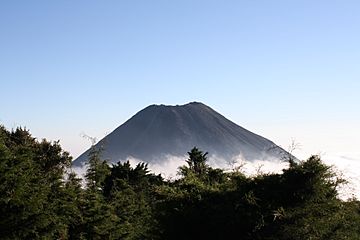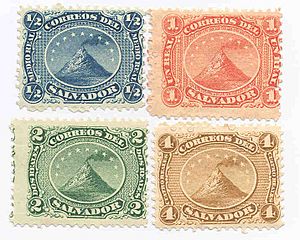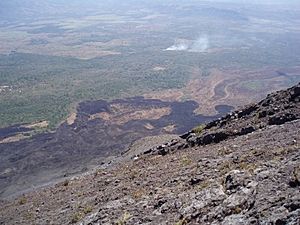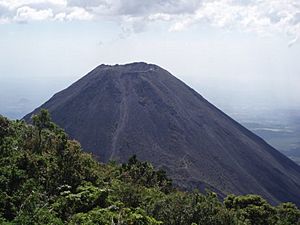Izalco (volcano) facts for kids
Quick facts for kids Izalco |
|
|---|---|
 |
|
| Highest point | |
| Elevation | 1,950 m (6,400 ft) |
| Geography | |
|
Lua error in Module:Location_map at line 420: attempt to index field 'wikibase' (a nil value).
|
|
| Location | El Salvador |
| Parent range | Cordillera de Apaneca |
| Geology | |
| Mountain type | Stratovolcano |
| Last eruption | October to November 1966 |
Izalco is a tall, cone-shaped stratovolcano located in western El Salvador. It stands next to the larger Santa Ana Volcano.
Izalco is famous for erupting almost non-stop from 1770, when it first formed, until 1958. Because of its constant glowing eruptions, sailors could see it from far away. This earned it the nickname "Lighthouse of the Pacific." The volcano also had a side eruption in 1966.
In 1926, a big eruption buried the village of Matazano. Sadly, 56 people lost their lives. The volcano actually grew on land that was very good for farming. People used to grow coffee, cacao, and sugar cane there.
Contents
What is Izalco Like Today?
Today, Izalco is much quieter. It mostly shows "fumarolic" activity. This means that rainwater seeps into the volcano and touches hot rocks. This creates steam, but it's not from deep underground gases.
The steam vents, called fumaroles, leave behind special mineral deposits. These deposits are known for having several rare minerals.
Visiting Izalco Volcano
Many tourists visit and climb Izalco Volcano. They usually start their trip from the Cerro Verde National Park. Izalco is a very important symbol for El Salvador. It was even shown on the 10 colón bank note. The colón was replaced by US dollars in 2001, so this bank note is no longer used.
The volcano is currently quiet, which means it's not erupting. However, it could erupt again in the future.
A hotel was once built on the nearby Cerro Verde mountain. It was meant to give visitors a great view of the erupting volcano. But Izalco stopped erupting shortly before the hotel was finished!
Izalco as a National Symbol

The Izalco volcano has been a symbol of El Salvador for a long time. It was featured on the country's very first postage stamps in 1867. The volcano on these stamps represented the country's coat of arms at the time. It was proudly called "El Faro del Pacífico" – "The Lighthouse of the Pacific." Stamps that were actually used from this time are quite rare. Only 37 of them have been found so far.
Izalco and The Little Prince
The famous French story, The Little Prince, by Antoine de Saint-Exupéry, might have been inspired by Izalco. In the book, the Little Prince lives on a small planet called Asteroid B-612. This planet has three tiny volcanoes. Two are active, and one is sleeping.
It is thought that Izalco and Santa Ana Volcano are the two active volcanoes in the story. Cerro Verde is believed to be the sleeping volcano. The author's Salvadoran wife, Consuelo de Saint Exupéry, likely inspired this part of the book.
See also
 In Spanish: Volcán de Izalco para niños
In Spanish: Volcán de Izalco para niños



